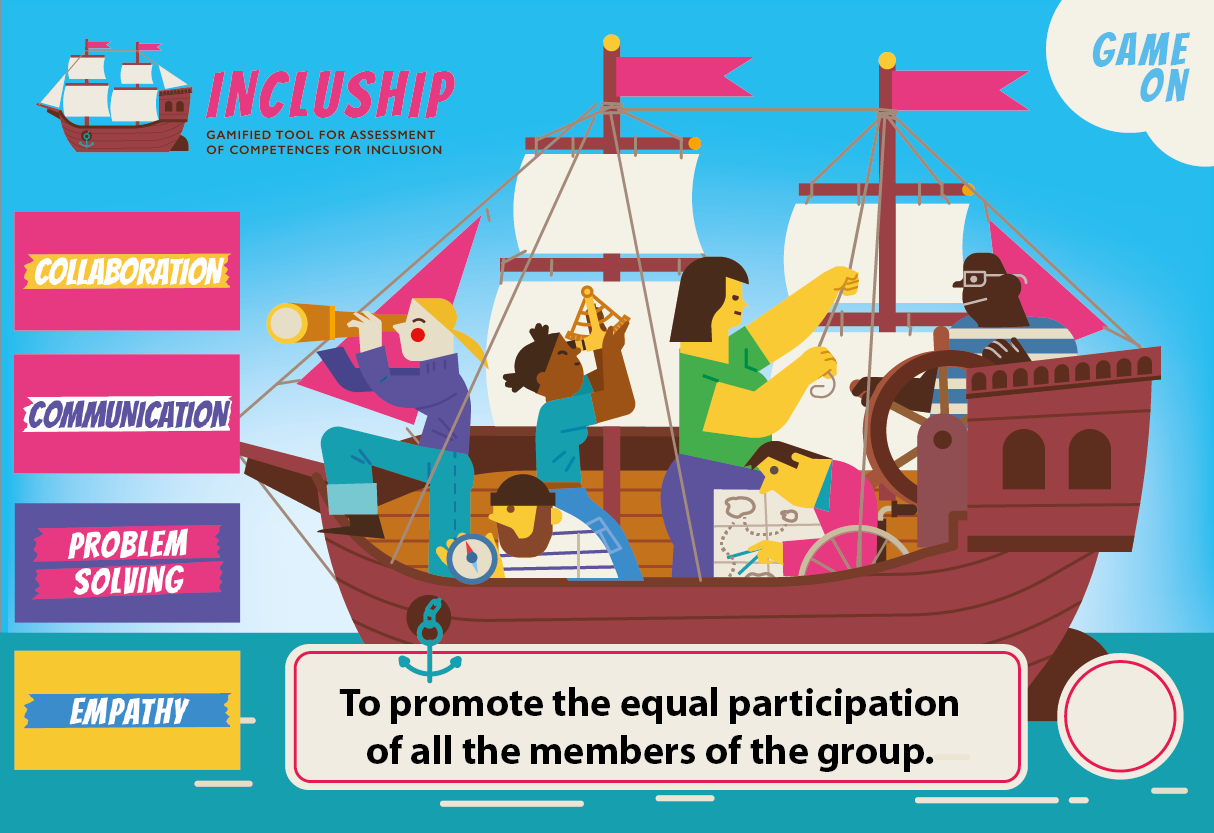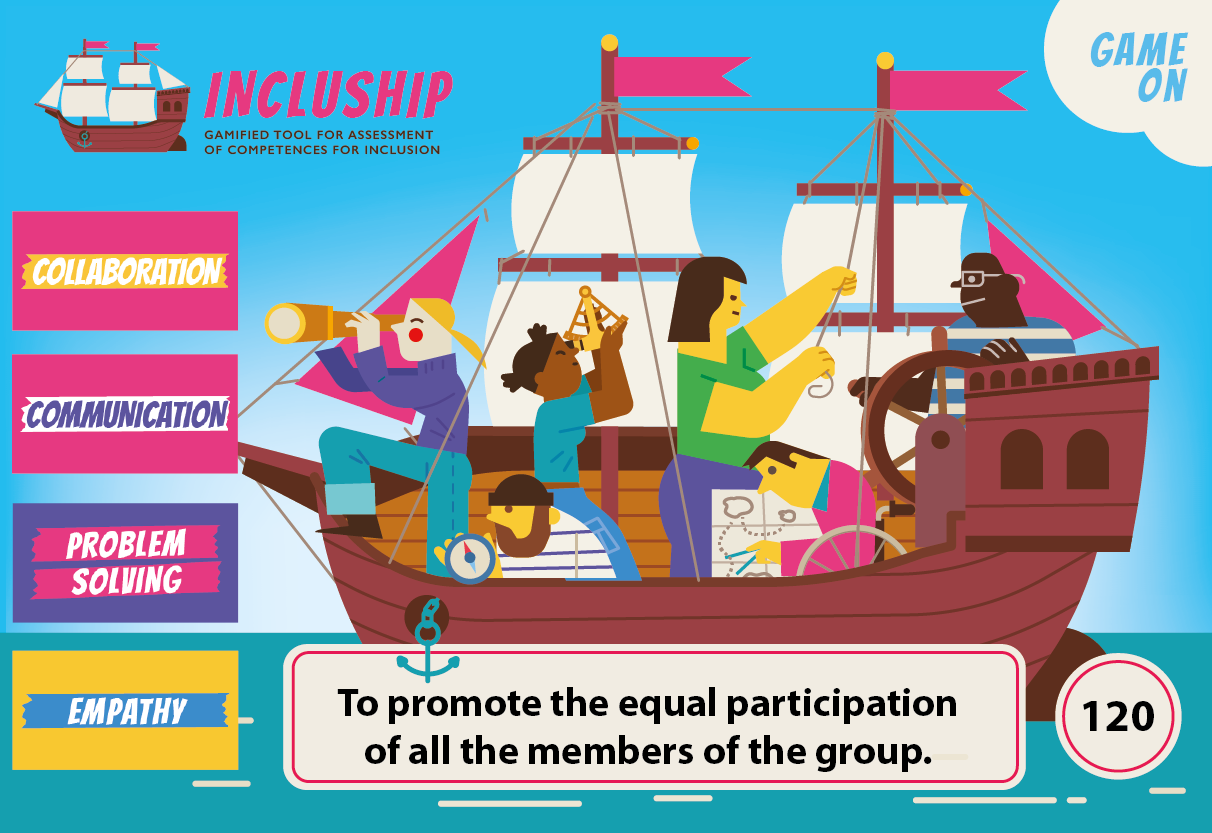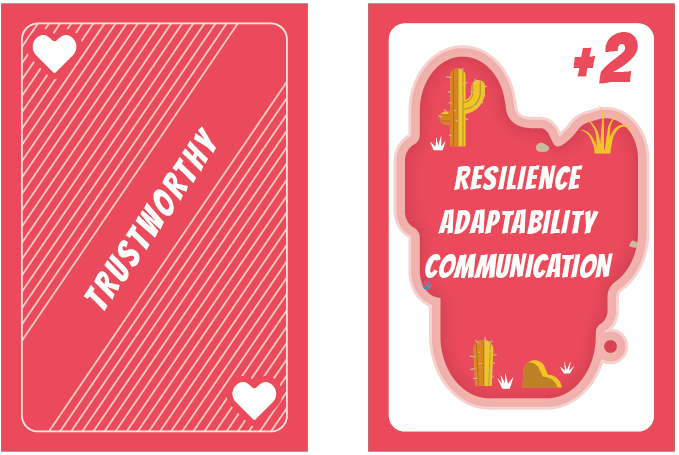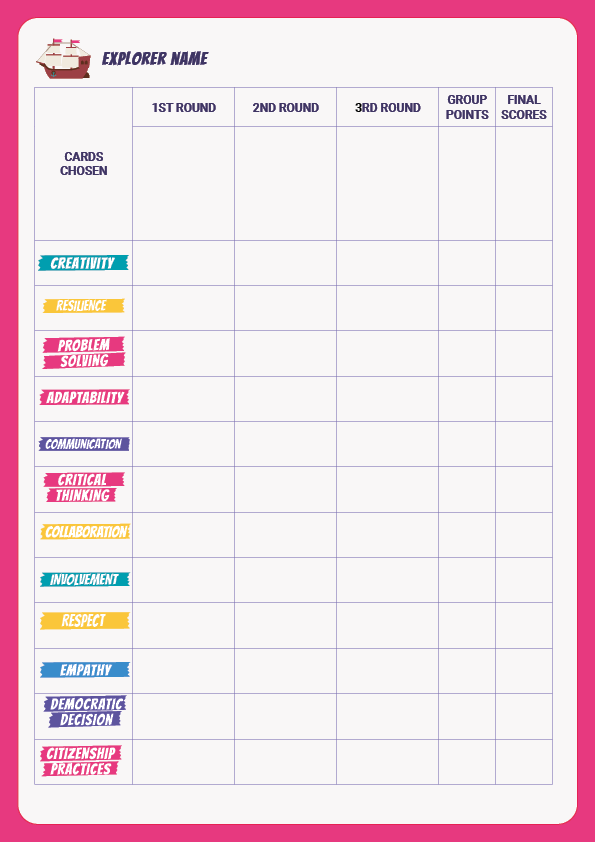1
GameOn: The first step of Incluship
GameOn: The first step of Incluship
Contenu
This activity will guide you through the first step of using Incluship, the gamified tool that was created by Idealúdica and the partners of the “GameOn” project to assess inclusion competences acquired through game design.
In this introductory activity you will present the tool to the group, its components and, in a collaborative form, you will choose and define an inclusion goal to achieve during the game design or creative process. Sometimes it seems difficult to choose the goal, because the participants don't yet know all the tool’s dynamics.
Explain to them that Inclusion is an extra activity of the project and that this tool will help us reflect and achieve the goal that the game design or creative process that we are going to begin will be as inclusive as possible.
Don’t worry if participants have some doubts at this stage: in the following stages everything will make more sense, will be clear, fun and interesting for everyone.
This first session should last about 30/45 minutes.
1. Choosing the inclusion goal
After printing and preparing all materials, place the Incluship board and the 12 competence islands on a board or a wall.
Explain to participants that Incluship is a tool to assess the development of the group’s inclusion competences throughout the project and that there will be several moments during the process when they’ll be invited to “build” their Incluship.
First, you must facilitate a discussion to define a group challenge, the “inclusion goal” of the group. This goal must be linked to social inclusion and not necessarily to the aim of the project, and must be decided together by the whole group of participants. This goal may be to solve an identified situation of exclusion within the group, or simply to promote inclusive work.
Examples of inclusion goals might be:
- To discover how to promote the inclusion of people with autism.
- To establish an inclusive work dynamic in the next project activities.
- To promote the equal participation of all the members of the group.
- To avoid racist attitudes or discriminative actions.
When chosen, write the goal in the blank space on the bottom (the hull) of the ship.
2. Choosing the 4 key competences
Then, discuss and identify with the group the 4 most important islands of inclusion necessary to achieve the chosen goal between the 12 given possibilities. This step is for focusing our assessment and promoting action in only a few elements, because evaluating 12 competences all at once would be too difficult.
The actions that participants will take during the game design or creative process, related to these 4 competences, will contribute to achieving the chosen inclusion goal.
You can share the definition of each competence (you can find them here) to facilitate the discussion.
When the group will have agreed on the 4 key inclusion competences for their goal, stick the tokens of the chosen competences on the board, in the four spots beside the ship.
See the example below:

3. Calculating the challenge value
Write now the value of the challenge in the blank circle in the bottom right of the ship board.
This value corresponds to the total of the exploration points that the participants should achieve throughout the project (using the exploration cards in the next steps) in the 4 key inclusion competence islands chosen at the beginning.
To calculate this value, you must use this formula:
Multiply the number of project participants by the number of evaluation (intermediate) sessions planned (between 1 up to 3) and multiply the result by 6.
Example: for a group of 10 participants with 2 evaluation sessions, the exploration value to be achieved for the group would be (10*2)*6= 120 points
KEEP IN MIND: During the development of the project you will explore several islands, but only the exploration points obtained on the 4 key competence islands selected, will count to achieve the final inclusion goal.
See the example below:

4. Exploration cards
Finally, explain that to get the exploration points needed to achieve our goal, all that participants need to do will be to participate in the project activities and reflect on their learning.
In the future evaluation sessions, you will invite participants to link their actions and behavior during the activities to the Incluship exploration cards, in order to reflect about:
- What skills they have implemented (green cards)
- What knowledge they have acquired (blue cards)
- What attitudes and behaviors they have shown (red cards)
The exploration cards that participants will get by taking part in the activities will give them exploration points on one or more competence islands.
See an example of the two sides of a red card below:

At the end of the project, together you will check with participants whether they have earned enough points, as a group, in the 4 key competences, in order to achieve their inclusion goal.
5. Explorer journal
To end the session, give one personal exploration journal to each participant. Everybody will write their name on it and keep it for the duration of the project.
This explorer journal will allow each participant to see what actions they have taken, what competence islands they have explored and how they have contributed to the group's overall objective.

To summarise…
- Choose the inclusion goal/challenge (ship)
- Choose the 4 key competences (islands) necessary to achieve the inclusion goal
- Calculate the value of the challenge, i.e. the total amount of points to be reached by the group
- Show the explorer cards and explain how the group will get the exploration points
- Give one personal explorer journal to each participant and explain its function
The following playlist activities will guide you through the next steps of the process, keep going to learn more about Incluship!
This activity is part of the wider educational effort of the international partnership “GameOn” to promote inclusion, participation, and critical thinking through game design. Learn more about this partnership here.
Expert partners:
Nexes (ES) – the lead partner, Idealúdica (ES), Universitat de Barcelona (ES), BalkanIdea Novi Sad (SR), Nectarus (LT), Associazione Interculturale NUR (IT).
Co-funded by the Erasmus+ Programme of the European Union
Cover image from Incluship presentation at the Game On International Expert Seminar in Italy.
Matériel
Get activity badge
GameOn: Incluship step 1 Get this badge
The owner of this badge has learned in detail about the first step to implement Incluship in a learning group process and is now able to facilitate it.
Incluship is a gamified tool that was created by Idealúdica and the partners of the “GameOn” project to assess inclusion competences acquired by participants in a game design group process.
This activity is part of the wider educational effort of the international partnership “GameOn” to promote inclusion, participation, and critical thinking through game design. Learn more about this partnership here.
Tâches
Tâche n°1
Preuve vérifiée par: en auto-approbation
Read the guide about the first step of implementing Incluship and share your thoughts on one or more of the following questions to earn the activity badge:
- What do you think would be the most challenging aspect when introducing Incluship to a group of participants?
- What are the elements you found most interesting in the first step of the process?
Compétences
ESCO
#transversal competences/skills
ESCO
#assessment methods
ESCO
#conduct self-assessment
ESCO
#promote inclusion
ESCO
#team-working
Organisateurs
GameOn - Game Design for Inclusion
Utilisé dans les playlists
GameOn: Assessing competences with Incluship
GameOn - Game Design for InclusionChanger de langue:

